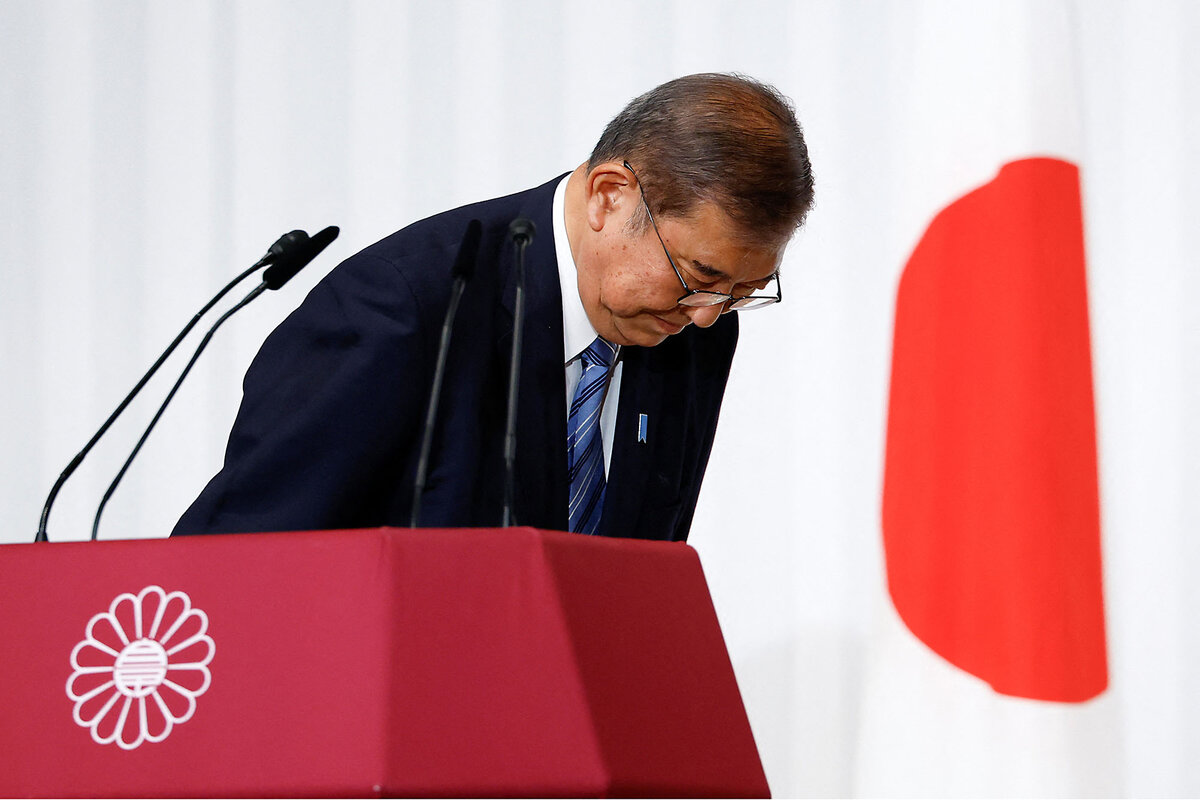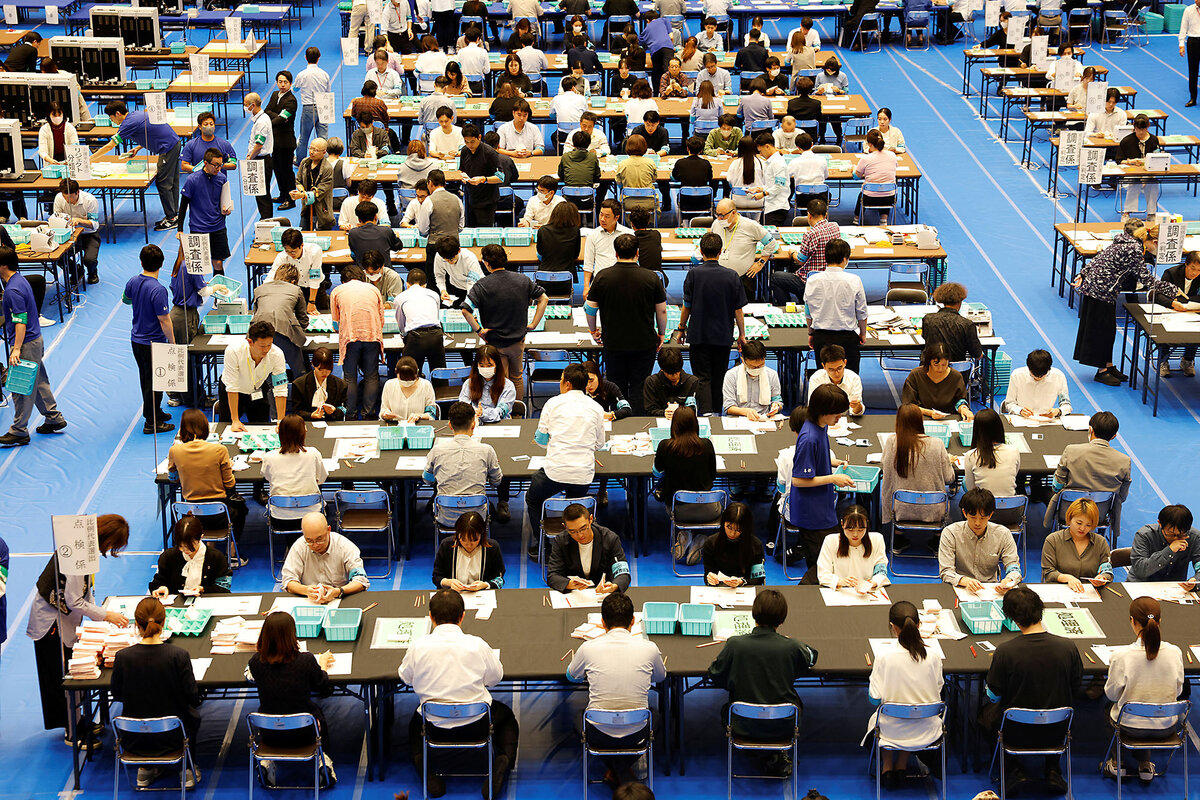Japan’s new PM hoped snap elections would secure grip on power. They backfired.
Loading...
| Tokyo
This was Ishiba Shigeru’s first major test as Japan’s prime minister, and it didn’t go as he hoped.
In Sunday’s snap elections, the long-ruling Liberal Democratic Party (LDP) and its junior coalition partner Komeito party lost their majority in the House of Representatives, marking the LDP’s worst showing in 15 years.
Now the administration of Mr. Ishiba, who inherited the scandal-wracked LDP just a month ago after an internal party election, must find a way to scrap together a stable government.
Why We Wrote This
In Japan, the long-ruling party’s dramatic loss in a parliamentary election underscores the public’s growing frustration with its leaders, and has plunged the country into political uncertainty.
Speaking at a news conference on Monday, a grim-looking Mr. Ishiba vowed to “humbly accept” the “extremely harsh verdict,” and to carry out fundamental reforms within the party. “The Japanese people expressed their strong desire for the LDP to do some reflection and become a party that acts in line with the people’s will,” he said.
But many analysts believe his days are numbered. As a vocal critic of LDP colleagues, Mr. Ishiba lacks a strong base of support within his party, and the election loss will further weaken his nascent government. Some predict a new period of “revolving door leadership,” like that seen from 2006-2012, when Japan had a new prime minister every year.
“The election result almost guarantees a chapter of political instability in Japan with multiple political parties seeking power,” says Nicholas Szechenyi, vice president of the Geopolitics and Foreign Policy Department at the Center for Strategic & International Studies (CSIS) in Washington.
Mr. Ishiba “likely squandered his opportunity to lead the nation,” he adds.
Ruling party rebuked
Public frustration with the LDP is rooted in the party’s recent slush fund scandal, which came at a time when many Japanese are caught between stagnant wages and rising prices. The revelation that party factions were illegally pocketing campaign money tanked Cabinet approval ratings and led to the resignation of Mr. Ishiba’s predecessor, among other LDP lawmakers.
Then, Mr. Ishiba – a moderate lawmaker and former defense minister who has vowed to revitalize Japan’s rural regions – took the reins. He immediately called for snap elections, a year earlier than legally mandated, to “win public confidence.”
That plan backfired, say political analysts. Indeed, in the lead-up to the election, the prime minister was “sucked into the outdated characteristics of the LDP,” says Yamaguchi Jiro, political science professor at Hosei University in Tokyo, including backpedaling on some key policies in order to appease party heavyweights.
He stopped talking about creating an Asian version of NATO, and has flip-flopped on raising interest rates.
Delivering a further blow to the prime minister just four days before the elections, the Shimbun Akahata, a daily newspaper of the Japanese Communist Party, revealed that the LDP had given 20 million yen ($131,000) to local chapters headed by candidates involved in the slush fund scandal – candidates that Mr. Ishiba had recently announced would not be endorsed by the LDP.
Though the prime minister said the money was provided to strengthen local branches, not to the candidates themselves, critics slammed the LDP for, in effect, financially supporting the scandal-tainted candidates.
Of the 48 candidates implicated in the scandal, 28 lost their parliament races.
New political landscape
Altogether, the LDP lost more than 50 seats. Meanwhile, the country’s main opposition party, the Constitutional Democratic Party of Japan, made significant leaps, increasing their seats from 98 to 148. But Japan’s opposition remains deeply fragmented, says Tamura Shigenobu, a Tokyo-based political analyst who has worked for 16 prime ministers.
He expects the LDP-led coalition to team up with two small parties – Sanseitō and the Conservative Party of Japan, which won three seats each – and then look to the Democratic Party for the People (DPP) for the last 12 seats needed to regain control of the 465-member lower house.
DPP leader Tamaki Yuichiro has said he has no intention of joining the ruling coalition, but suggested that his party could work with the coalition on an individual policy basis. Either way, these messy coalition politics will hinder the incoming government’s ability to enact transformative policy, and force Mr. Ishiba to compromise on major issues, including how money is handled in politics.
This is all assuming Mr. Ishiba stays in power. While Mr. Ishiba has signaled his intent to stay on as prime minister, it’s possible that the LDP will use this election to give him the boot before next year’s upper house elections, possibly kick-starting a period of revolving door leadership.
“Another period of political instability in Japan would presumably generate angst” in Washington based on painful memories of the now-defunct Democratic Party of Japan’s 2009-2012 tenure, says Mr. Szechenyi, who serves as senior fellow with the Japan Chair at CSIS. The party “had no governing experience and performed miserably for most of its three subsequent years in power,” he says.
After the LDP retook power in 2012, the late premier Abe Shinzo brought political stability and built broad consensus on Japan’s approach to foreign policy, including strengthening defense capabilities and developing a strong alliance with the United States, adds Mr. Szechenyi.
“A string of short-term governments would not yield radical changes in Japanese foreign policy,” he explains. “But it would affect Japan’s capacity to implement its strategic objectives, which could stunt some of the recent momentum for bolstering bilateral ties. Japan’s goals are clear, but it could take some time to find a new leader strong enough to carry the ball forward.”








